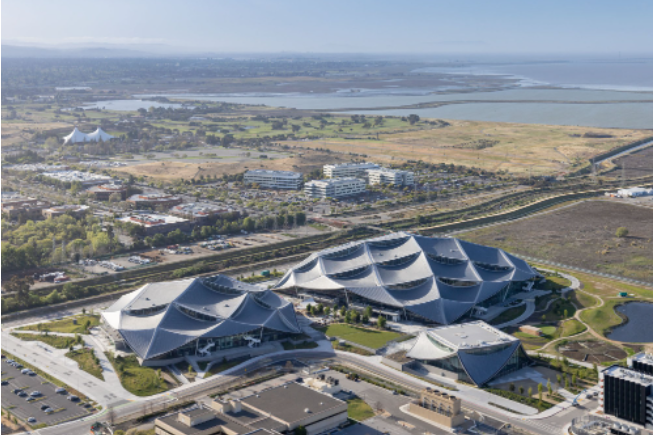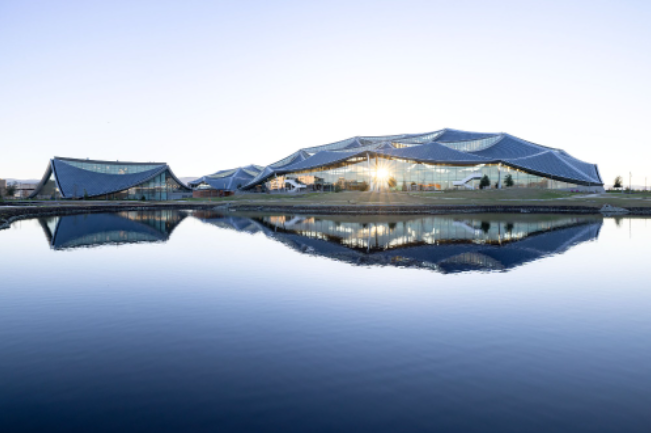First touted all the way back in 2013 in a rather interesting Vanity Fair profile piece, Google's so-called built-from-scratch sustainable campus finally opened its doors on Tuesday, May 17. The 1.1 million square foot complex boasts expert-situated team spaces on its upper floors and a canopy-covered second level with gathering and collaboration areas for separated focus points amid the workday.

The company's first-ever major campus proves to be not only a turning point in the employee working environment but still very much a work-in-progress as the company assesses the nature of its appeal with staff as hybrid work dissolves. The tech firm announced in March that employees were expected to return to work for at least three days beginning on April 4, which included those in the Bay View area.
Within the new Google Campus, though, staff at least won't be cramped as the massive complex is set to fit a whopping 4,000 employees within its guise. It'll also contain within the grounds 17.3 acres of lush nature-intensive topography, such as a marsh, woodland, and wet meadows. The area will have sophisticated water retention ponds, which are intended to collect and reuse water, as well as instill natural restoration to the campus.

If these exterior concepts just weren't enough, integrated technologies seep from the outside in via the campus' geothermal pule system, which will aid in cooling and heating the interior. On its futuristic canopy, Google has implemented a "dragonscale solar skin" meant to be powered via carbon-free wind farms 90% of the time. It'll also have two massive kitchens that run primarily on electricity that will shuffle food and beverages to the campus' seven different cafetaries.
Related Article: Apple's Ex-AI Exec, Who Disagreed with its Return-to-Work Rules, Heads Back to Google

Designed by Google's vice president of real estate and workplace services, David Radcliffe, Google's Bay View Campus is intended to "prioritize the experience of the people in the building over the exterior form." He explains amid Google's published blog post that, following varied discussions with staff, Radcliffe learned that employees were "happy, productive and creative when they came together in teams," yet required areas that were "buffered from sound and movement to get deep-focus work done."
"The upper floor is broken down into smaller neighborhoods separated by courtyards and connected via ramps that gradually rise as you move to the center of the building," adds Radcliffe. "This variation in the floor plate gives teams a designated area that changes with their needs, while keeping them close to their larger work community."
The Google Campus likewise features designated areas that follow a theme, which include the "Campfire Corner," "Turkey Terrace," and even "Plankton Palace." It's a nice touch to what in all intents and purposes feels much like a Disneyland-inspired working environment. Even so, while the outward connotations seem to present Google's campus as forward-facing for its many employees, the tech firm has come under fire of late in ways of approaching its staff.
Despite the three-day hybrid schedule, much of the staff were purportedly unhappy with the April 4th return-to-work mandate. Additionally, reports also suggest that Google's diminished pay for employees moving to lower-cost areas didn't sit well. One March-dated CNBC article proves via the company's internal survey that only 46% of respondents considered their pay as competitive to rival companies, a supposed 12-point dip from the previous year.
Despite its efforts in building such a remarkable complex, many in the field believe the working environments of yesteryear are long over. Due in large part to the pandemic and burgeoning technologies, like the metaverse, office spaces are no sooner dissolving not just as ways to profit more via certain companies but also as a simple means to an end. The ideal is best expressed via Airbnb's CEO Brian Chesky, who said in an interview with The Washington Post, "The office as we know it is over."
In any case, it's clear Google has certainly pulled out all the stops with its new campus complex, and it will surely sit well with staff in the long run.
ⓒ 2025 TECHTIMES.com All rights reserved. Do not reproduce without permission.




